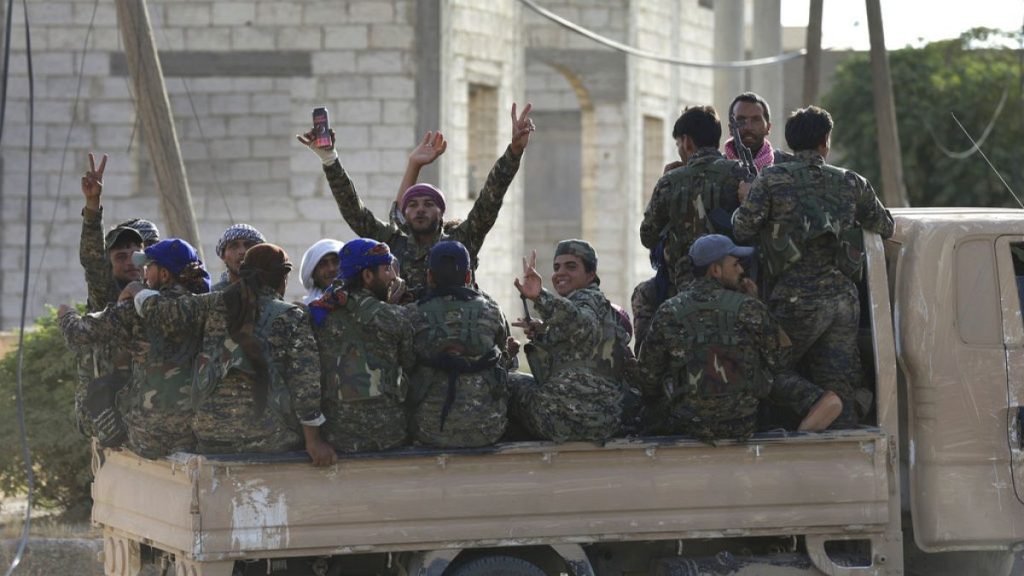The unexpected fall of Bashar al-Assad’s regime in Syria has ushered in a period of uncertainty and unease, particularly for the Kurdish population in the north. While much of Syria grapples with the implications of the new rebel-led government, the Kurds, a significant ethnic minority and a crucial US ally, find themselves facing a precarious future. Their hard-won autonomy, achieved through years of fighting against various factions including ISIS, is now threatened by the ascendance of Sunni Arab rebels and the influence of Turkey, a long-time adversary of the Kurds. The shifting power dynamics have created a volatile environment, leaving the Kurds to navigate a complex political landscape fraught with potential conflict and the risk of losing their self-governance.
The Kurdish-led Syrian Democratic Forces (SDF), backed by the US, express concern over the free movement of ISIS fighters within Syria following Assad’s downfall. Despite the rebel group’s initial peaceful overtures towards the Kurds, incidents like the forceful expulsion of Kurdish fighters from Deir al-Zour and Turkey’s airstrikes on a Kurdish convoy highlight the fragile nature of the current peace. These actions, coupled with the seizure of Manbij by a Turkey-backed opposition faction, underscore the existing tensions and the potential for further escalation. The Kurds, who have historically relied on US support, now face uncertainty with the incoming Trump administration, known for its skepticism towards US involvement in Syria. This leaves the Kurds vulnerable and questioning their future security and autonomy.
The Kurds, a stateless ethnic group dispersed across Turkey, Iran, Iraq, and Syria, have a long history of persecution. In Syria, they carved out an autonomous region during the civil war, maintaining a neutral stance towards both the Assad regime and the rebel forces. Their effectiveness in combating ISIS earned them the support of the US-led coalition, and they formed the SDF, incorporating Arab fighters into their ranks. With US support, the SDF successfully liberated vast territories from ISIS, including its capital, Raqqa. This victory, however, did not fully secure their position, as they continue to face threats from Turkey and the evolving political landscape within Syria.
Turkey’s hostility towards the Kurds stems from its perception of the SDF as an extension of the Kurdish insurgency within its own borders. Turkey considers the primary Kurdish faction a terrorist organization and opposes its presence in a post-Assad Syria. This stance has fueled Turkey’s support for the Syrian National Army (SNA), which has actively fought against the Kurds in northern Syria. While the SNA presents itself as part of the anti-Assad opposition, analysts suggest their motivations are primarily driven by opportunism and anti-Kurdish sentiment. The Kurds, already engaged in conflict with the SNA, now face the added challenge of navigating a relationship with the new Syrian leadership, which also maintains close ties with Turkey. This complex web of alliances and rivalries poses a significant threat to the Kurds’ hard-won autonomy.
The new rebel leadership, led by former al-Qaeda militant Ahmad al-Sharaa (formerly Abu Mohammed al-Golani), claims to strive for a new Syria inclusive of all religious and ethnic groups. While initial interactions between the rebels and the SDF appeared positive, with the rebels avoiding Kurdish-controlled areas during their advance, subsequent events have cast doubt on the sustainability of this peaceful coexistence. The rebels’ declaration of intent to advance towards Raqqa and other Kurdish-held territories raises the specter of renewed conflict. Any potential agreement between the rebels and the Kurds for their inclusion in the new political order would likely necessitate acknowledging Kurdish autonomy in the east. However, such a concession could strain relations with Turkey, a key power broker in post-Assad Syria, further complicating the Kurds’ future.
The Kurds’ reliance on US support continues under the Biden administration, demonstrated by high-level military meetings. However, the future of this alliance remains uncertain, especially with the possibility of a return to power by Donald Trump, who previously withdrew US troops from Syria, abandoning the Kurds to a Turkish incursion. This decision drew widespread criticism, including from within the Republican party, for betraying an ally. Although Trump later partially reversed this decision to protect oil fields in the east, the incident highlighted the vulnerability of the Kurdish position in relying on US support. The Kurds, therefore, face a precarious future, caught between regional rivalries, a new uncertain political order in Syria, and the unpredictability of US foreign policy. Their ability to maintain their autonomy and secure their place in a post-Assad Syria remains a significant challenge.














